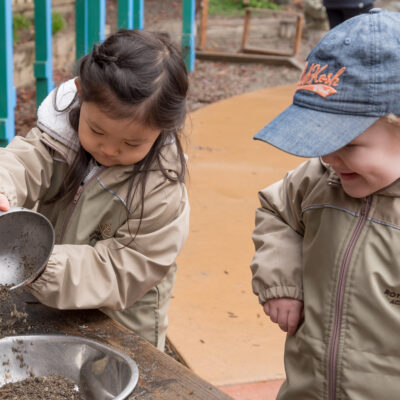Did you know that the United Nations recognizes play as a right of every child? This is so because play is essential for child development. Play can help encourage communication, foster positive relationships, and improve cognitive skills.
Since 90% of brain development occurs by the age of 5, caregivers in daycare settings must provide an environment that is safe and gives children a variety of opportunities to play and explore.
Below are some types of play that should be encouraged to facilitate the holistic development of your child.
Independent or solitary play
Independent or solitary play is crucial for the development of a child’s imagination, creativity, concentration, and ability to explore. Independent play allows children the freedom to use their imagination to create stories and invent and act out scenarios. It helps to build social independence, self-sufficiency, and self-confidence as they learn to be comfortable on their own. This type of play encourages children to take risks and problem-solve. They get to test their hypothesis and find solutions to play on their own, thereby building their self-esteem and identity.
Time alone allows a child to play in a relaxed environment, at their own pace, and to regulate their emotions. When a child is overstimulated, it can lead to tantrums. Having time alone to relax helps them counteract overwhelming emotions, re-centre, and develop coping skills.
Parallel play
Children will start to feel a part of a social construct through parallel play. During parallel play, toddlers will still play independently but in the presence of other children. Despite not actively engaging other children, your child will listen and take note of how others interact. These observations will be utilized later when they feel comfortable and ready to collaborate with others. Children at this stage do not understand the concept of sharing and are protective of what they consider to be theirs. This provides an opportunity to introduce toys, like building blocks, that can be shared or group activities such as ring games.
Associative play
Associative play encourages interaction and the sharing of toys. Toddlers may not yet be ready to work on a common goal together, but they are building their communication skills and learning to adapt to others’ expectations. As their social and self-regulatory skills develop, they will become more interactive with their peers.
Cooperative or group play
During group play, your toddler will be more sociable and inclusive. Cooperative play is a culmination of all that has been learnt in the various stages of play. Children are more interactive, share toys and ideas, and collaborate on a mutual activity. Children should still be allowed to set the pace and create the theme for their play activities. Caregivers should only intervene in cooperative play if there is a need to quell a social dispute or assist with problem-solving skills.
Natural or outdoor play
Integrating outdoor play in daycare learning helps to improve a child’s motor skills, increases muscle strength, spatial and sensory skills, and self-awareness. Outdoor play provides children exposure to natural light, which enhances mental health and performance. It gives toddlers opportunities to explore independently and in groups.
The Rothewood Method
Play is a natural part of being a child. It feeds brain development while building progressive skills your child will need to support them in the future. At Rothewood Academy Early Learning centres, we are committed to the holistic development of your child. We encourage and support age-appropriate forms of play by providing an enriching curriculum and environment that nurtures free exploration and collaboration. Give us a call today to schedule a tour to experience the Rothewood Educational Method.


Leave a Reply
You must be logged in to post a comment.